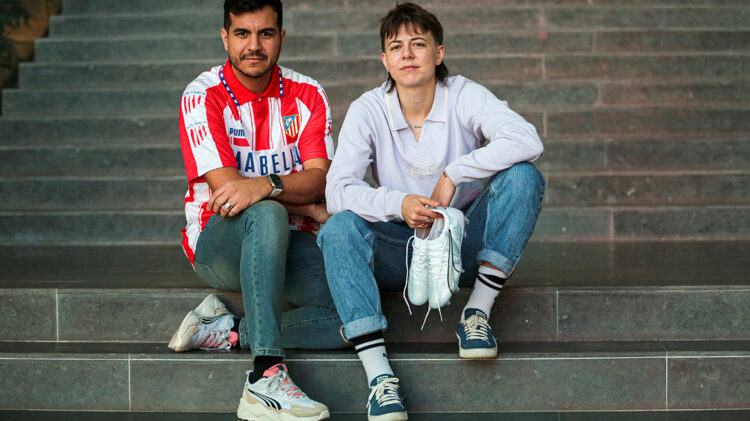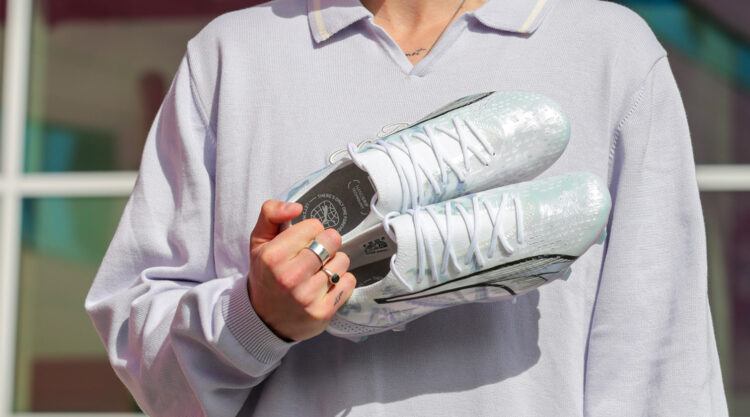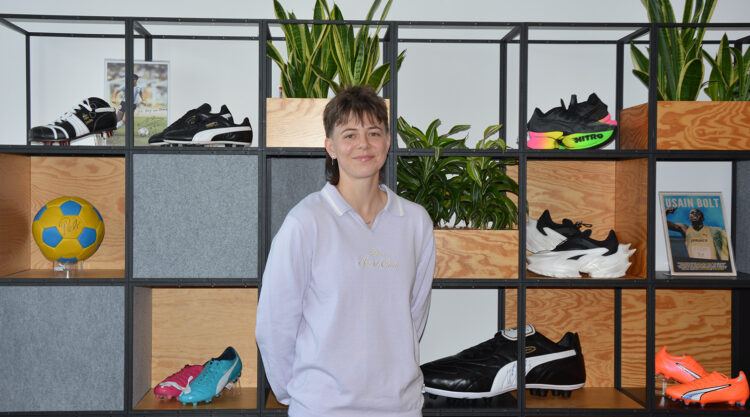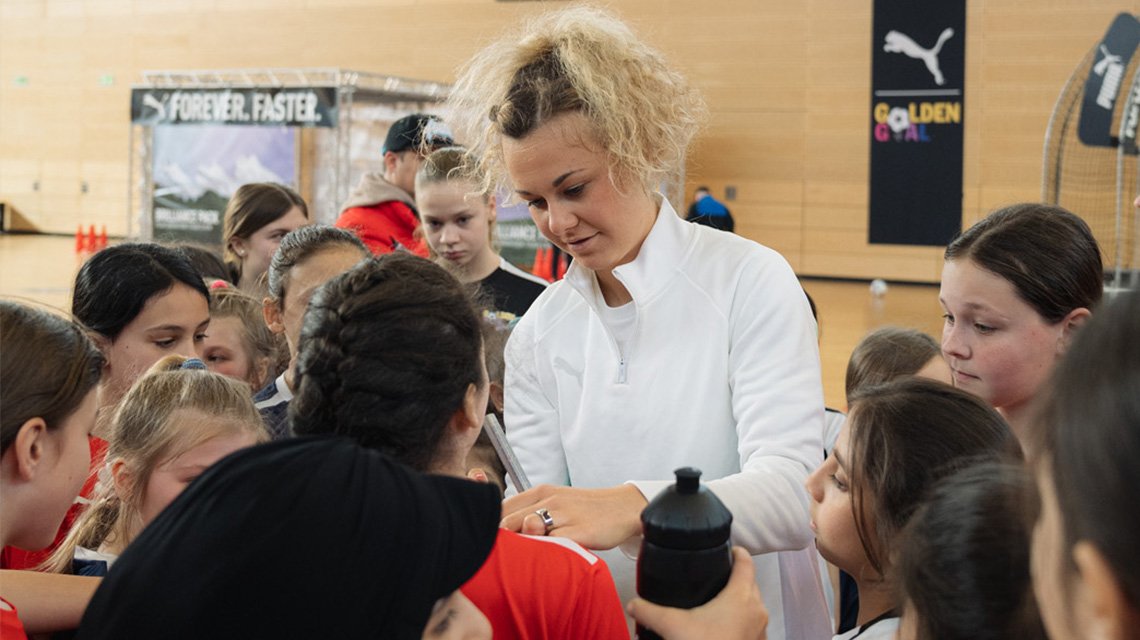
Brilliance of
the Defender
Meet PUMA Athlete and New Zealand National Football Player Meikayla Moore
March 28, 2023Meet PUMA Athlete and New Zealand National Football Player Meikayla Moore
March 28, 2023Meikayla Moore is an experienced defender who has played club football in Germany, England and now Scotland. The 26-year-old PUMA athlete currently plays for Glasgow City in the Scottish Women’s Premier League and is part of the New Zealand national team (the Football Ferns). Meikayla is also a passionate advocate for LGBTQ+ rights and uses her platform to raise awareness and inspire others.
Her cool mullet hairstyle is as unique and bold as her playing style on the soccer field. During her visit to the PUMA headquarters, we were lucky enough to have a chat with her. Find out what possibly being part of the World Cup, co-hosted by her home country, means to her and why being an outspoken member of the LGBTQ+ community is important for her.
Get to know Meikayla a little better. We asked her eight questions in FOREVER.FASTER. style:
tik tok or Instagram?
Meikayla: Instagram
Cardio or weights?
Meikayla: Weights
Favorite series?
Meikayla: The Walking Dead
Cats or dogs?
Meikayla: Dogs
Going to a restaurant or take out?
Meikayla: Restaurant
Favorite sweet treat?
Meikayla: Chocolate in general
Favorite PUMA product?
Meikayla: ULTRA football boots
Auckland or Christchurch?
Meikayla: Christchurch
“It’s about controlling what I can control in my own club environment, setting myself lots and lots of targets on a weekly and monthly basis to make sure I’m in the best possible shape I can be when July 20th rolls around.”
This year, the Women’s World Cup will be held in your country. How does that make you feel?
Meikayla: Every time I have to answer this question, it’s hard for me to put into words how big the World Cup is in my home country, who are co-hosts with Australia. It is a great opportunity, not only for us as players, but also for the growth of our sport in these countries. For both Australia and us, New Zealand, football is not the number one sport. For us it’s rugby. So I think it’s a huge opportunity for the rest of our nation to experience football, but also to see the professional women who are in the game and the development of women’s football. It’s on the rise at the moment and I think these games will only continue that journey for football.
How does it feel to probably be included in the squad for the World Cup?
Meikayla: The squad hasn’t been named yet, but yes, I hope to be one of those 23 or 21 players. I have not yet been able to set foot on a World Cup pitch. I was very young in Canada and then in France. I picked up a serious injury before, so I hope I’m lucky the third time around.
How are you currently preparing for the World Cup?
Meikayla: For me it’s about controlling what I can control in my own club environment, setting myself lots and lots of targets on a weekly and monthly basis to make sure I’m in the best possible shape I can be when July 20th rolls around.
Women’s soccer has evolved rapidly in recent years. What are your aspirations for the future?
Meikayla: I think the opening match for us is going to be massive. I think being a host nation, we’ve obviously received a more favourable draw than we have been given in the past.
We have goals within our team and I have goals individually for this World Cup. But I think the opening game against Norway is really going to set kind of a precedent of how that World Cup journey is going to go for us. It’s going to be a big match. And obviously opening the games in Auckland with family and friends in the crowd is going to be phenomenal.
How do you see your team’s chances at the World Cup?
Meikayla: I think that as a team we want to get through the group stage, and from there anything is possible. We have never won a game at a World Cup, so that is our first goal. And then, we want to get through the group and get as far as we can.
On Instagram you stated, “The World Cup will continue to drive change, inclusion and positivity.”
What is your vision for this World Cup and what do you think will drive that change?
Meikayla: I think women’s footballers are something of a precedent for change. I think the men’s World Cup 2022 was a challenge for many, and I think women’s footballers are very active not only on the pitch but also off the pitch. I think it drives a lot of us. For me personally, I’m grateful that those who came before me gave me the opportunity to be part of those days, and I’m very grateful for that. But I want to leave football in a better state than it is now. And I think many female footballers are on the same path with that message.
How do you like the new PUMA Brilliance Pack?
Meikayla: I have fallen in love with these boots. I think they are absolutely stunning. They will look beautiful with our white jersey for New Zealand. I like the lilac touch.
“I think we have a long way to go as a sport. When you talk about football as a whole, there’s still a huge stigma when it comes to sexuality and how you identify and where you fall on the broad spectrum. I think the simplest answer for me, without going into too much depth, is that we just need to be better people. We need to accept people for who they are and try to create an environment that allows people to be who they are.”
You are openly out for more than a decade. Sexuality in women’s football is more of a fluent topic, definitely not a taboo topic, much more open than the men´s. What do you think men’s football can learn from women’s football – especially when it comes to LGBTQ+?
Meikayla: I think it’s always difficult to answer that question as a woman because it’s still a challenge for many women to come out. But it is obviously, as you said, less taboo. On the men’s side, we’ve had a couple of men come out in the last few months. We had a male player in the Scottish league come out and also an Australian came out a few months ago. I think we have a long way to go as a sport. When you talk about football as a whole, there’s still a huge stigma when it comes to sexuality and how you identify and where you fall on the broad spectrum. I think the simplest answer for me, without going into too much depth, is that we just need to be better people. We need to accept people for who they are and try to create an environment that allows people to be who they are. And if you can’t look in the mirror and say that you do that every day, then that’s an internal problem that you have to deal with. And we’re just not there yet where men feel they can come out. But I hope that will change very soon. When I came out, I was very lucky to have the support of my family and loved ones. I keep alluding to the fact that sport has helped me a lot to come to terms with who I am. I am very grateful to women’s football for that.
Have you ever experienced negative reactions because of your sexuality on the pitch or via social media?
Meikayla: On social media, yes. I think when I speak out about something, I’m always going to get headwind, especially online. But as I’ve grown and become more immersed in the world of social media, I guess you just have to accept that and learn to deal with it. And I feel like I’ve had the privilege of coming out now, and as you said, for almost a decade. I’ve been able to come to terms with who I am and how I identify. Thanks to those who came before me, I am now able to tell my story and hopefully help those around me. I consider it a privilege to do that.
Do you have role models? Maybe even in the LGBTQ+ community?
Meikayla: I grew up in New Zealand. When I first made my way into the senior team, there was a lot of women in that squad who helped me. One of them was my best mate, Ria Percival. Overall, I admire women like Magdalena Eriksson and Pernilla Harder. Of course, Megan Rapinoe and Sue Bird as well. I think they have great visibility and are fantastic role models for the LGBTQ+ community. It’s very encouraging.
How do you manage to balance your training program with your personal life?
Meikayla: That is a difficult question. I studied for a while and graduated last year with a Bachelor of Health Science. For me it was very important to take time out of my week where I’m not focusing on football. Whether it’s to go out and do something – I’m an avid coffee drinker, so I like to explore different cafes in Glasgow. But I also enjoy focusing fully on football and having that mindset, especially in such a big year for myself. I think the times have aligned perfectly and I enjoy focusing fully on football at the moment. I think sometimes though, it’s hard to separate yourself, especially if you’re a footballer.
What advice would you give to young, aspiring players who have just started playing football?
Meikayla: The first big time I wasn’t in football was my first big injury in 2019, and I think that’s when I realised I wasn’t sure who I was outside of football. I’ve grown up playing football since I was four years old, and when you’ve been doing it your whole life, you don’t really have that separation between what you do and playing football. Playing football is all you want to do. And then when you don’t have that anymore, I almost had an identity crisis. I worked a lot with external people, therapists, and psychologists to find out who I am apart from football. Football is something I do. It’s not who I am. And sometimes I think that even nowadays and after everything I’ve been through, it’s hard not to fall back into the trap of being identified as a footballer because I’m a human being first and foremost.
Thank you for the interview and your time, Meikayla! Your PUMA family wishes you all the best for the rest of the season and many more sporting highlights this year!



